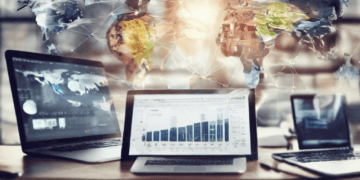Advancements in technology are reshaping global economic landscapes, raising questions about the benefits and broader implications of these innovations.
There has been a notable shift in attitudes toward technological innovation. Initial concerns about the pace of progress are giving way to increased optimism, largely due to the accelerated innovation spurred by the pandemic. The rapid development of COVID-19 vaccines, the widespread adoption of digital technologies for work, and the surge in digital payments are among the significant advancements witnessed in recent years.
However, this wave of innovation also raises concerns about potential job displacement through increased automation. Yet, it presents an opportunity for the emergence of new, potentially higher-paying roles. Unlike previous industrial revolutions, the current phase benefits from a wealth of knowledge and experience, offering the possibility of a more equitable and sustainable Fourth Industrial Revolution (4IR).
The digitally-driven 4IR stands as the fastest period of innovation, fueled by advancements in artificial intelligence, robotics, the internet of things, nanotechnology, and biotechnology.
To address concerns about workforce impact, collaboration between private and public sectors is vital. Investment in skills development to leverage these new technologies becomes imperative for both sectors.
Esther Mallowah, Head of Tech Policy at ICAEW, emphasizes the need for aligning skill sets with technological advancements. She highlights the potential for employers to access a broader talent pool through remote work, while employees can leverage new technologies for personal skill growth.
PwC’s report, “Enabling A Sustainable Fourth Industrial Revolution,” identifies ten emerging 4IR technologies that could significantly impact jobs, livelihoods, and environments, aligning with the UN’s Sustainable Development Goals.
Examples cited in the report illustrate how these technologies could revolutionize various industries. For instance, in the energy sector, there’s a focus on creating a next-generation clean distributed grid using AI, machine learning, blockchain, and IoT-enabled peer-to-peer trading. Similarly, in finance, fintech innovations like AI and blockchain aim to enhance financial accessibility, market integrity, and potentially provide early warning signals for financial strains.
Robert Harwood, COO at Slingshot Simulations, notes the rapid digitalization across industries, leading to cost reduction, faster innovation, and improved customer solutions.
Developed and developing economies are already witnessing these advancements. The acceleration of digital payments and the growing role of digital finance in countries like Singapore, Kenya, and Brazil highlight the transformative potential of technology.
Initiatives like the Africa Digital Financial Inclusion Facility (ADFI) aim to promote financial inclusion across Africa using digital financial services. Their goal is to provide access to finance for millions, particularly women, by 2030.
Mallowah underscores technology’s role in improving quality of life, citing free communication tools like social media and WhatsApp that connect people globally and empower small businesses.
Africa, in particular, has seen significant strides in digital financial services, contributing to poverty alleviation and supporting small businesses.
Harwood notes that developing nations often have opportunities to leapfrog technological transitions, as seen in the rapid adoption of mobile phone technology in Africa.
The integration of IoT into supply chains is expected to enhance data monitoring, potentially leading to the use of smart contracts and improved consumer access to data, promoting accountability among companies.
Technological advancements have not only transformed production and connectivity but have also facilitated innovation and product development across the globe.
The success of this digital era hinges on collaborative efforts between public and private sectors. Governments and regulators must adapt regulations to match the pace of innovation to prevent monopolies and safeguard citizens’ interests. As we continue to incorporate new technologies into our lives, there is hope that concerns about future job scenarios will diminish, signaling an era of widespread change and optimism for the future.
Stay updated with supply chain news at The Supply Chain Report. Learn more about international trade at ADAMftd.com with free tools.
#TechAdvancements #DigitalRevolution #4IR #InnovationImpact #Automation #AITrends #IoT #FinTech #DigitalFinance #SustainableTech #TechForGood #GlobalInnovation #SkillDevelopment #SmartTech #Collaboration

















